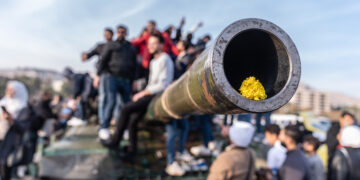Rights groups urge United Nations not to adopt IHRA definition of antisemitism
Sixty human rights and civil rights organizations, including DAWN, wrote to Secretary-General António Guterres and the High Representative for the UN Alliance of Civilizations Miguel Ángel Moratinos. They explain that while antisemitism is poses real harm to Jewish communities around the world and requires meaningful action to combat, the UN should not to adopt the International Holocaust Remembrance Alliance's (IHRA) working definition of antisemitism which has been misused to falsely label criticism of Israeli government policies as antisemitic.
The full text of the letter can be read below.
3 April 2023
Dear UN Secretary-General António Guterres and Under Secretary-General Miguel Ángel Moratinos:
Our coalition of 60 civil society organizations is writing to you to voice our strong support for the United Nations' commitment to combatting antisemitism in line with international human rights standards. Antisemitism is a pernicious ideology that poses real harm to Jewish communities around the world and requires meaningful action to combat it. Our organizations call on world leaders to condemn antisemitism and to take steps to protect Jewish communities, including holding perpetrators of hate crimes accountable.
As the UN develops its own action plan towards a coordinated and enhanced response to antisemitism rooted in human rights, we are aware that a number of Member State governments and organizations aligned with some of those governments, as well as the former Special Rapporteur on Freedom of Religion or Belief Ahmed Shaheed, have been advocating that the UN adopt and use the "working definition of antisemitism" of the International Holocaust Remembrance Alliance (IHRA). We urge the UN not to do so.
The IHRA definition was originally developed to guide research and law enforcement data validation before being used by the IHRA in its work, which includes education about the Holocaust and antisemitism. Adoption of the definition by governments and institutions is often framed as an essential step in efforts to combat antisemitism. In practice, however, the IHRA definition has often been used to wrongly label criticism of Israel as antisemitic, and thus chill and sometimes suppress, non-violent protest, activism and speech critical of Israel and/or Zionism, including in the US and Europe. Such misuse has also been criticized by the former Special Rapporteur on Racism E. Tendayi Achiume.
Ken Stern, the main drafter of the IHRA definition, recently reiterated his concerns about the institutional adoption of the definition in light of its proposed inclusion in an American Bar Association (ABA) draft resolution on antisemitism. Stern's concern stems from the IHRA definition's repeated use as "a blunt instrument to label anyone an antisemite." In the end, ABA members adopted a resolution on antisemitism that did not reference the IHRA definition. Stern's message to ABA applies equally to the UN.
Those who use the IHRA definition in this way tend to rely on a set of eleven "contemporary examples of antisemitism" attached to the definition by the IHRA in 2016. Seven of those examples refer to the state of Israel. These examples, which are presented as possible illustrations and indicators to "guide the IHRA in its work", include:
- "denying the Jewish people their right to self-determination; e.g. by claiming that the existence of a State of Israel is a racist endeavour" and
- "applying double standards by requiring of [Israel] a behavior not expected or demanded of any other democratic nation."
The wording of the first example above on "racist endeavour" opens the door to labeling as antisemitic criticisms that Israeli government policies and practices violate the International Convention on the Elimination of Racial Discrimination and the findings of major Israeli, Palestinian and global human rights organizations that Israeli authorities are committing the crime against humanity of apartheid against Palestinians. This example could also be used to label as antisemitic documentation showing that Israel's founding involved dispossessing many Palestinians; or arguments, also made by some Members of the Israeli Knesset, to transform Israel from a Jewish state into a multiethnic state that equally belongs to all of its citizens – that is, a state based on civic identity, rather than ethnic identity.
The example on "applying double standards" opens the door to labeling as antisemitic anyone who focuses on Israeli abuses as long as worse abuses are deemed to be occurring elsewhere. By that logic, a person dedicated to defending the rights of Tibetans could be accused of anti-Chinese racism, or a group dedicated to promoting democracy and minority rights in Saudi Arabia could be accused of Islamophobia. This example suggests also that it is antisemitic to evaluate Israel as anything but a democracy, also when assessing its actions in the Occupied Palestinian Territory, where it has for more than half a century governed millions of Palestinians who have no say on the most consequential issues affecting their lives and who are deprived of their basic civil rights.
The IHRA qualifies the examples by noting that "criticism of Israel similar to that leveled against any other country cannot be regarded as antisemitic" and that any finding of antisemitism must "[take] into account the overall context." However, in practice, these disclaimers have failed to prevent the politically motivated instrumentalization of the IHRA definition in efforts to muzzle legitimate speech and activism by critics of Israel's human rights record and advocates for Palestinian rights.
The targets of accusations of antisemitism based on the IHRA definition have included university students and professors, grassroots organizers, human rights and civil rights organizations, humanitarian groups and members of the US Congress, who either document or criticize Israeli policies and who speak in favor of Palestinian human rights. If the UN endorses the IHRA definition in any shape or form, UN officials working on issues related to Israel and Palestine may find themselves unjustly accused of antisemitism based on the IHRA definition. The same goes for numerous UN agencies, departments, committees, panels and/or conferences, whose work touches on issues related to Israel and Palestine, as well as for civil society actors and human rights defenders engaging with the UN system.
After the United Kingdom's government adopted the IHRA definition of antisemitism at the national level, at least two UK universities in 2017 banned certain activities planned for "Israel Apartheid Week." One of them, the University of Central Lancashire, banned a panel planned by Friends of Palestine on boycotts of Israel. A university spokesperson stated, "We believe the proposed talk contravenes the [IHRA] definition" of antisemitism "formally adopted" by the government.
In February 2020, Israel advocacy groups in the US challenged Pitzer and Pomona College's support for a film screening about Palestinian protests in Gaza against Israeli repression and a panel on "Perspectives on Colleges and the Israeli-Palestinian Conflict," featuring the prominent Jewish commentator Peter Beinart and Palestinian-American Yousef Munayyer, hosted by Students for Justice in Palestine (SJP). The Israel advocacy groups claimed that SJP's positions, such as its support for the Boycott, Divestment and Sanctions (BDS) movement, are "clear indicators of anti-Semitism under the examples listed by the IHRA." In January 2020, Israel advocacy groups called for the University of Michigan to review the agenda for a "Youth for Palestine" conference focused on student activism and community organizing on Palestine, and to "compare it to the IHRA definition," and consider canceling it over concerns that it will feed antisemitism.
Some advocates of the IHRA working definition have presented it as a non-controversial "consensus definition". However, many leading antisemitism experts, scholars of Jewish studies and the Holocaust, as well as free speech and anti-racism experts, have challenged the definition, arguing that it restricts legitimate criticism of Israel and harms the fight against antisemitism.
Since 2021, at least two alternative definitions have been put forward: the Jerusalem Declaration on Antisemitism by hundreds of scholars of antisemitism, Holocaust studies, Jewish studies and Middle East studies, as well as the Nexus Document by a task force affiliated with Bard College and the University of Southern California. While acknowledging that criticism of Israel can be antisemitic, these alternative definitions set out more clearly what constitutes antisemitism and provide guidance surrounding the contours of legitimate speech and action around Israel and Palestine.
As an international organization committed to the universal promotion of the rule of law and human rights, the UN should ensure that its vital efforts to combat antisemitism do not inadvertently embolden or endorse policies and laws that undermine fundamental human rights, including the right to speak and organize in support of Palestinian rights and to criticize Israeli government policies.
For these reasons, we strongly urge the UN not to endorse the IHRA definition of antisemitism.
We look forward to assisting the UN's efforts to combat antisemitism in a way that respects, protects and promotes human rights.
Sincerely,
- Addameer Prisoner Support and Human Rights Association
- Al-Haq, Law in the Service of Mankind
- Al Mezan Center for Human Rights
- American Civil Liberties Union (ACLU)
- B'Tselem
- Defense for Children International – Palestine
- Gisha – Legal Center for Freedom of Movement
- Human Rights Watch
- International Federation for Human Rights (FIDH)
- Ligue des droits de l'Homme (LDH)
- Palestinian Centre for Human Rights (PCHR)
- Physicians for Human Rights – Israel
Joined by:
- 11.11.11
- 7amleh – The Arab Center for Social Media Advancement
- Africa4Palestine
- American Friends Service Committee
- Association des Universitaires pour le Respect du Droit International en Palestine
- Association France Palestine Solidarité (AFPS)
- Association "Pour Jérusalem"
- Belgian Academics & Artists for Palestine (BAA4P)
- BDS Netherlands
- Broederlijk Delen
- Canadians for Justice and Peace in the Middle East
- CCFD-Terre Solidaire
- CIDSE
- CNCD-11.11.11
- Collectif Judéo Arabe et Citoyen pour la Palestine (CJACP)
- Combatants for Peace
- Comhlamh Justice for Palestine
- Le Comité de Vigilance pour une Paix Réelle au Proche-Orient (CVPR PO)
- Democracy for the Arab World Now (DAWN)
- European Jews for a Just Peace
- European Legal Support Center (ELSC)
- European Middle East Project (EuMEP)
- Finnish-Arab Friendship Society
- Global Ministries of the Christian Church (Disciples of Christ) and United Church of Christ
- Global Ministries of the United Methodist Church
- Independent Jewish Voices Canada
- Israeli Committee Against House Demolitions (Finland)
- Israeli Committee Against House Demolitions (UK)
- Jewish Network for Palestine (UK)
- Jewish Voice for a Just Peace in the Middle East (Germany)
- Jews for Palestine-Ireland
- Kairos Ireland
- La Cimade (France)
- Ligue des droits humains (LDH)
- Medico international
- Mouvement de la paix France
- Nederlands Palestina Komitee
- One Justice
- Palestinian NGOs Network (PNGO)
- Parents Against Child Detention
- Pax Christi USA
- Plateforme des ONG françaises pour la Palestine
- Presbyterian Church (USA)
- The Rights Forum
- Une Autre Voix Juive (France)
- Union Juive Française pour la Paix (UJFP)
- United Jewish People's Order of Canada
- University Network for Human Rights
- Women in Black (Vienna)





































